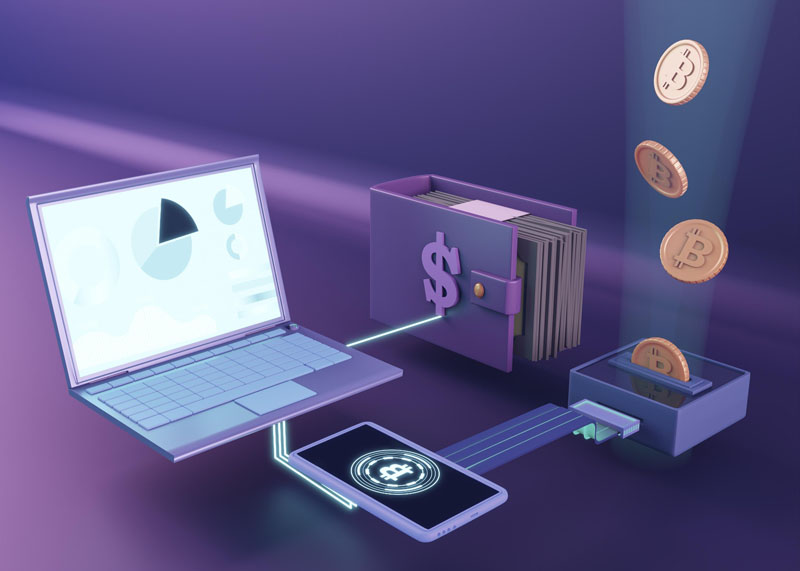A wallet is needed to buy, sell, or do almost anything else with cryptocurrency. The private keys for your digital assets are stored in crypto wallets. These private keys are used to authorize transactions.
What’s a software cryptocurrency wallet?
A software crypto wallet is all digital, just like the name suggests. These software programs or apps can be used on a desktop PC, laptop, mobile phone, or another digital device. Some software wallets, like MetaMask, Trust Wallet, and Exodus, may already be familiar. These wallets are used by a lot of people and have a lot of helpful security features.
For example, Trust Wallet is a popular software wallet that can store various cryptocurrencies, such as Bitcoin and Ethereum. This software wallet is not only easy to use, but it also puts security front and center. Trust Wallet comprises PIN codes, biometric searching, and recovery seed phrases.
The platform never stores user information on its servers, which is another way to keep your information safe. Software wallet applications can also have extra features, like the ability to stake. Several coins and tokens can now be staked using software wallets like Atomic Wallet, Phantom, and Exodus.
Depending on the crypto wallet you use, you can only bet on certain types of crypto. Some application wallets also give you information about the market and let you buy or sell crypto right from the app. But software wallets have one big problem: they need computers to work.
Software wallets work as apps on digital devices, and they rely heavily on the security features of that device to keep your money safe. For instance, if you had the Exodus desktop app running on your gadget and a hacker wanted to get in, it would be much easier for them to do so if antivirus software, firewalls, etc., didn’t protect your device.
Even if your data is encrypted in your software wallet, some types of malware can still get around this security measure. Keyloggers are often used to break into cryptocurrency wallets, leading to the loss of thousands or even millions of dollars.
There are ways to safeguard yourself from keyloggers, which is good news. It doesn’t imply that cryptocurrency software wallets are completely unsafe, but it is something to think about. Now, let’s talk about how hardware wallets work.
What’s a Hardware Crypto Wallet?
Your private keys are kept in a hardware crypto wallet, a physical device. These small pieces of hardware can be held in one hand and put away safely. But why would you want to keep your private keys on a physical device? People mainly use equipment for crypto wallets because they are very safe.
As was already said, software wallets are always at risk of being hacked from afar, but hardware wallets don’t have this problem. This is because your private keys are kept outside of your hardware wallet. They can be linked to your PC or desktop to do certain things, but most of the time, they are not connected to a computer at all.
Because hardware wallets store your private keys offline and don’t connect to the internet, they are pretty much cut off from the rest of the world. Because of this huge security feature, hardware wallets are safer than software wallets in general. On the other hand, hardware crypto wallets aren’t as popular as application wallets, mostly because of how much they cost.
Most software wallets are free to use. On the other hand, hardware wallets are hardware objects you have to buy. You can get a good software wallet, like the Ledger Nano S or the Trezor Model One, for $60 to $80. This isn’t a huge investment, but it is still an investment. This is why most people who own crypto would rather choose the free option.
Ledger and Trezor are the two biggest hardware wallet companies on the market. Let’s look at the Ledger Nano X to learn more about the safety features of hardware wallets. The Ledger Nano X is a very well-known hardware wallet that can keep your digital money safe.
The Blockchain Open Ledger Operating System, or BOLOS, is used by this wallet. This OS is unique to Ledger. It makes it possible to build decentralized apps while keeping each one completely separate from the others. BOLOS keeps your hardware wallet’s applications from seeing your recovery seed phrase.
BOLOS also works with the Nano X’s Secure Element chip, which lets applications in your wallet store encrypted data. This chip is where your valuable secret keys are kept. Again, this protects your information and makes it very hard to get to and steal.
The Nano X can’t be changed, and a PIN code keeps it safe. Of course, you should keep your PIN code a secret and store it in a safe place away from the computer. Some cryptocurrencies can also be staked with a wallet, but you usually need to use a desktop app like Ledger Live.
So, overall, there’s no doubt that wallets are safer than software wallets. However, software wallets are much easier to use and don’t cost anything. Software wallets are the best way to store private keys for a short period, while hardware wallets are the best way to store all your secret keys for a long period.
Custodial wallets and non-custodial wallets
You can also divide crypto wallets into two groups: custodial and non-custodial wallets. A wallet that holds and helps protect your secret keys for you is called a custodial wallet. On either hand, a wallet that doesn’t hold your private keys puts you in charge and gives you full access to them.
Regarding custodial versus non-custodial wallets, various people have varied tastes, although the latter is usually considered the safer option. This happens because you don’t have to trust a third party to keep your secret keys and defend your assets. But if you use a wallet that doesn’t keep your money safe, you must be extremely careful.
In this case, you are the only one responsible for your secret keys, so you must keep your wallet password and healing seed phrase secret and store them safely. Software wallets can be either non-custodial or custodial, but wallets are always non-custodial.





